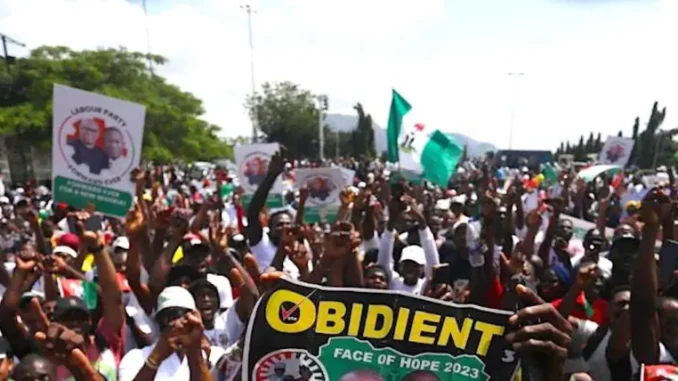
Morris Monye, the director of mobilisation for the Obedient Movement, a pro-Peter Obi political group, has resigned his role in the group, lamenting Mr Obi’s lack of commitment to the movement.
Mr Monye, who claimed he spent “approximately N40 million” on the movement, announced his resignation in a statement shared on Thursday, less than a month after two top members of the group in diaspora dumped the group.
“I have spent approximately N40 million of personal funds (my own money) on donating for Obidient events,” Mr Monye said. “No money was given to the Directorate of Mobilisation. There’s no bank account even for the directorate.”
Mr Monye said that, despite his contribution to the Obidient Movement, Mr Obi, the beneficiary of the movement, has shown no commitment to the movement or maintained good communication with the directorate he heads.
“In fact, Mr Peter Obi has never asked what we are doing in mobilisation. Nothing of such. No communication. Nothing. I spent those personal monies because I believe in the movement as a vehicle for a new Nigeria. I also don’t expect any repayment back from anyone,” Mr Monye claimed. “Almost a year down the line, most of our short-term, medium, and long-term plans have not been met. I won’t be part of optics and no work. The poor showing at the Anambra election has also made my position untenable.”
In October, two top members of the diaspora group, David Ogula, director of Diaspora Engagement at the Obident Movement, and Bolanle Emiabata Anibaba, co-director, left the group.
“Given a series of manipulative and self-destructive events, we, the undersigned, have decided to decouple ourselves from the present configuration of the structure of the ‘Obidient Movement’ and its ‘directorate’.
“A carefully planned framework to establish local structures to build a formidable force for good was subverted by pedestrian antics.
“Lacking an understanding of the legal requirements for operating a cross-border non-profit organization, some proffered a dysfunctional, opaque setup that stripped the diaspora of its legal autonomy and obstructed its ability to operate within the laws and regulations of the countries Nigerians have adopted. Ultimately, it became clear that we had been riding on a dirt road in a broken vehicle and had come to a dead end,” they stated.
Leave a Reply